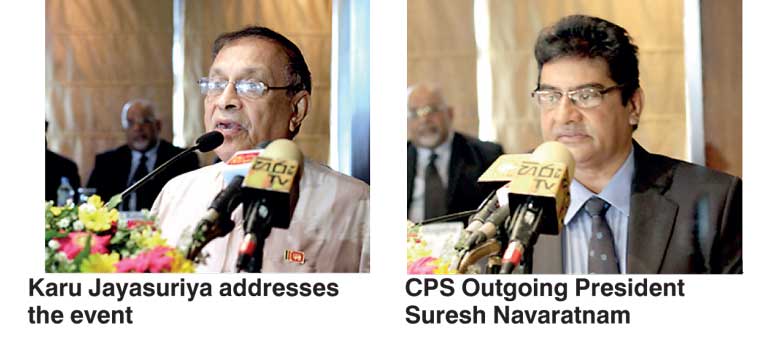Wednesday Feb 18, 2026
Wednesday Feb 18, 2026
Monday, 5 October 2015 00:00 - - {{hitsCtrl.values.hits}}

By Shiran Illanperuma
Outgoing Ceylon Planters Society President Suresh Navaratnam lamented the low retirement age for planters that was depriving the industry of experienced men at the ‘prime of their careers’ at a time when out-migration of planters is also a pressing concern, creating a gap in experience for the future of the industry.
Keeping up with Sri Lanka’s ageing population, the increase in retirement age for government and private sector employees from 55 to 60 in 2013 has not been applied to planters according to the Navaratnam in his official review at the CPS Annual General Meeting.
Speaking to a packed audience of planters at the AGM, Navaratnam expressed his sympathy to those who had to retire in the prime of their careers, some with children still undergoing schooling. “We have a funny situation in this country where the planter boss has to quit at 55 while his staff and labour can go on until 60 years,” he said.
Meanwhile, newly elected President Ajantha Munamalle promised to pursue this issue during his term. “We gain experience with time and should be able to contribute to this industry until age 60. With 30% of CPS membership set to retire in 10 years we are facing a potentially severe lack of experience,” he said.
These grievances have been aired at a variety of forums and expressed directly to government officials, according to both Navaratnam and Munamalle. Despite CPS lobbying with the help of distinguished ex-planters, private companies have thus far refused to accede to requests for reasons that speakers did not specify.
Chief Guest and Speaker of Parliament Karu Jayasuriya acknowledged the concerns regarding the ‘retirement issue’ and stressed that it should receive the earliest attention from policy makers in order to stem planter frustrations. However, he did not offer an immediate solution to allay planters’ concerns.
Acknowledging their historical economic contribution to the island, Jayasuriya said that planters continue to be important to the creation of wealth in this country, and are ‘a breed of people who should be recognised’. He added that the senior leaders of the Government were sure to acknowledge their roles in stimulating the industry.
Founded in 1936, the Ceylon Planters Society seeks to promote the interests of the planters in the industry. Before unionisation, planters were subject to the whims of their employers with unregulated salaries and ‘hire and fire’ contracts that made employment unstable.
New President of Ceylon Planters Society, Ajantha Munamalle called for radical changes in the century old mentality of the plantation industry by calling on planters to recognise that their chief competitors were in fact beverage manufacturers.
With flat lining commodity prices and ongoing socio-political crises in key export destinations, Ceylon tea has struggled to find a foothold in new markets. Munamalle encouraged a paradigm shift, arguing that tea as a beverage had to compete with established brands like Coca Cola.
Munamalle argued that if tea had to compete with popular carbonated beverages then investments needed to be made in marketing for the product to make inroads with new consumer bases. “Established beverages spend heavily on branding and advertising, this is a marketing tactic that we need to emulate in the plantation sector,” he said.
Speaking out against the state of the industry, Munamalle argued that planters were the only segment of the industry not making a profit after nationalisation. “We are burdened with all the costs of productions while brokers, distributors and retailers continue to reap in profits,” he said.
“Planters and the plantation industry are very resilient. We have gone through 20 years of privatisation and 40 years of nationalisation but there needs to be a paradigm shift if we are to survive,” he said, in his first delivery as President of the 79 year old union.